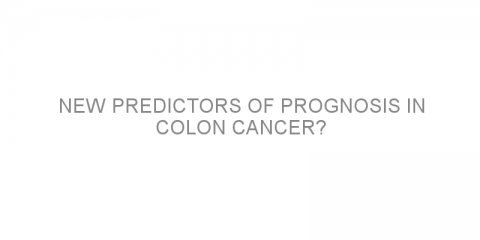In a nutshell The current study examined whether the proteins versican and lumican were predictive of prognosis among colon cancer patients. Some background Colon cancer treatments vary depending on the type and stage of the disease. Patients with advanced cancer, which has invaded the surrounding lymph nodes, usually receive chemotherapy along...
Read MoreCurrent stage?-Stage I Posts on Medivizor
Prognostic significance of BRAF mutations
In a nutshell This study evaluated the effect of BRAF mutation on survival among early stage melanoma patients. Some background The B-raf protein, encoded by the BRAF gene, plays an important role in regulating cell growth and division. Mutations in the BRAF gene are implicated in approximately 40% of all melanoma cases. BRAF mutation is...
Read Morep300 as a prognostic marker for colorectal cancer survival
In a nutshell This study evaluated p300 as a potential prognostic marker for colorectal cancer survival. Some background Survival of colorectal cancer patients is currently estimated according to cancer staging and lymph node involvement. However, both survival and the response to treatments vary widely between patients. Therefore, new molecules...
Read MoreEvaluating outcomes of watchful waiting
In a nutshell This study described the clinical outcomes of active surveillance in patients with localized (confined) prostate cancer. Some background Active surveillance (AS), also known as watchful waiting, is an alternative to treatment for patients with early stage (localized, not spreading) prostate cancer. AS includes regular digital rectal...
Read MoreMulti-parametric magnetic resonance imaging: Is active surveillance right for you?
In a nutshell This study evaluated the use of multi-parametric magnetic resonance imagining (MRI) in the selection of prostate cancer patients for active surveillance. Some background Active surveillance was introduced as a therapeutic strategy to avoid overtreatment of cancer patients with a relatively non-threatening disease. In active...
Read MoreFun in the sun favors survival
In a nutshell The current study explored the association between sun exposure and melanoma outcome. Some background Physicians normally advise against excessive sun exposure due to the increased risk of skin cancer. However, recent studies have suggested that sun exposure may be associated with lower mortality rates among melanoma patients. The...
Read MoreTherapies for recurrence after radiotherapy
In a nutshell This review evaluated the safety and efficacy of focal salvage ablative therapy for the treatment of patients with prostate cancer recurrence (return of the cancer) after radiation therapy. Some background Radiation therapy (RT) is often used to treat early stage prostate cancer. However, after RT, the cancer may recur, locally...
Read MoreCan PHIP gene predict prognosis?
In a nutshell This study investigated the link between the number of copies of a gene called the pleckstrin homology domain-interacting protein (PHIP), melanoma metastasis (spread of cancer cells to distant organs and tissues of the body) and ulceration (breaking of the skin over the melanoma with loss of surface tissue). Some background Melanoma...
Read MoreWhat can predict cancer recurrence in node-negative patients?
In a nutshell This study investigated which traits of low-risk breast cancer can predict the risk of cancer recurrence after treatments. Some background The majority of women who are diagnosed with breast cancer have node-negative cancer, meaning breast cancer that has not spread to regional lymph nodes. Node-negative breast cancer patients have a...
Read MoreVitamin D and prognosis in breast cancer
In a nutshell This article evaluated the association between vitamin D levels and risk of breast cancer recurrence (return of the cancer) after treatment. Some background Vitamin D is both a nutrient we eat and a hormone our bodies make, that helps regulate the flow of calcium into the bloodstream and is crucial for normal bone development. Unlike...
Read MoreCould menopausal symptoms predict prognosis?
In a nutshell This present study evaluated the role of menopausal symptoms in the prognosis of breast cancer patients. Some background Menopause is the period in a woman’s life after menstruation stops and the ovaries become inactive, defined as 12 months after a woman's last period. With menopause, the level of female sex hormones such...
Read MoreBetter looking breasts with IMRT
In a nutshell This study investigated the cosmetic benefits of intensity modulated radiation therapy (IMRT) compared to standard radiotherapy for the treatment of breast cancer. Some background Radiation therapy is commonly used to treat breast cancer. It is often used following surgery to destroy any remaining cancer cells and prevent recurrence...
Read More














